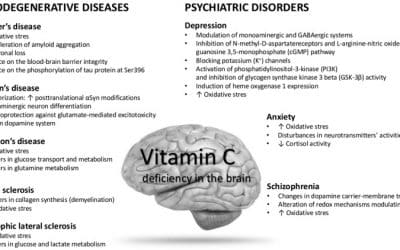Abstract In this review, we summarize the involvement of ascorbic acid in neurodegenerative diseases by presenting available evidence on the behavioral and biochemical effects of this compound in animal models of neurodegeneration as well as the use of ascorbic acid...
Key Multiple Sclerosis Research
This page contains the latest research on the use of Hyperbaric Oxygen Therapy (HBOT) to treat Multiple Sclerosis. Explore our database on Key Multiple Sclerosis Research and Hyperbaric Oxygen Therapy aka, HBOT, below. Extivita maintains an extensive research & publication database for various diseases and therapies such as Hyperbaric Oxygen Therapy, Neurofeedback, Nutritional IV Therapy, Infrared Sauna, and Pulsed Electromagnetic Field Therapy.
For a complete list of indications treated at Extivita, explore the conditions we treat.
Does Vitamin C Influence Neurodegenerative Diseases and Psychiatric Disorders?
Abstract Vitamin C (Vit C) is considered to be a vital antioxidant molecule in the brain. Intracellular Vit C helps maintain integrity and function of several processes in the central nervous system (CNS), including neuronal maturation and differentiation, myelin...
Effect of neurofeedback training on depression and fatigue in patients with multiple sclerosis
Abstract Depression and fatigue are common symptoms of multiple sclerosis (MS) and are the primary determinants of impaired quality of life in this demyelinating neurological disease. Untreated depression is associated with suicidal ideation, impaired cognitive...
Effect of BEMER magnetic field therapy on the level of fatigue in patients with multiple sclerosis: a randomized, double-blind controlled trial
Abstract Objectives: Electromagnetic field therapy has been reported to be beneficial in patients with multiple sclerosis (MS) with significant fatigue. This study was designed to evaluate the long-term effects of Bio-Electro-Magnetic-Energy-Regulation (BEMER) on...
Depression in multiple sclerosis: A review
Abstract Several studies have reported high rates of depression in multiple sclerosis (MS) with a lifetime prevalence of approximately 50% and an annual prevalence of 20% not uncommon. Concern about the potential of new drug treatments to exacerbate or precipitate...
Long-term hyperbaric oxygenation retards progression in multiple sclerosis patients
Objective: To evaluate the effect of prolonged courses of hyperbaric oxygen treatment (HBO2T) on the progressive deterioration of multiple sclerosis (MS) patients. Design: Prospective study of the disability of 703 MS patients first treated five or more years previ-...
Hyperbaric oxygen and multiple sclerosis: final results of a placebo-controlled, double-blind trial.
The long term results are reported of a trial involving 120 patients with chronic multiple sclerosis who were randomised to receive either 100% oxygen at 2 atmospheres absolute (ATA) for 90 minutes daily for 20 sessions or placebo therapy with air using a simulated compression procedure. The previous finding of subjective improvement in bowel/bladder function at the end of treatment was not confirmed by objective urodynamic assessment. The treatment did not alter disease progression as measured by the Kurtzke disability status scale nor did it alter the rate of acute relapse. There was less deterioration in cerebellar function at one year in the treated patients as measured by the Kurtzke functional systems scale. No other differences were found between the two groups. Psychometric tests and measurements of lymphocyte sub-populations showed no treatment related effects. Evoked potential studies showed no improvements but there was a significant reduction in amplitude of the visual evoked potential in the treated patients at the end of therapy. This might indicate a reversible degree of retinal damage induced by oxygen toxicity.







